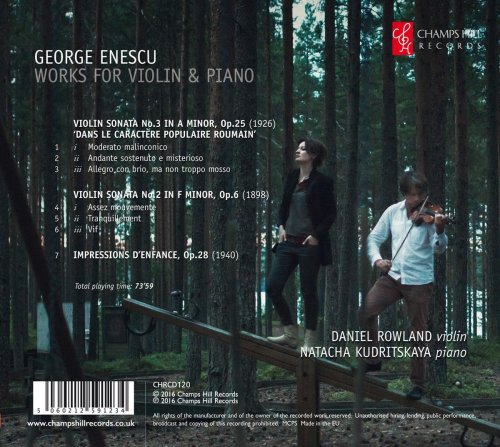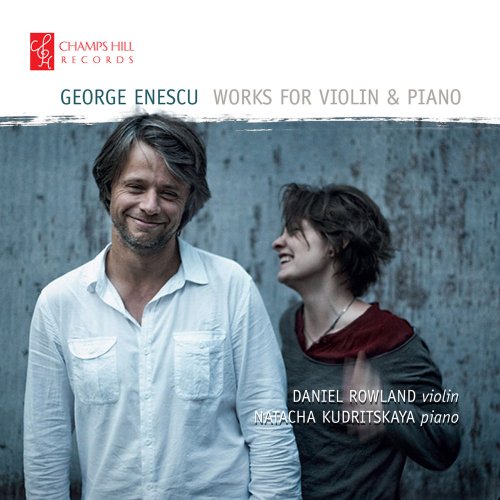
Daniel Rowland & Natacha Kudritskaya - George Enescu: Works for Violin & Piano (2016)
BAND/ARTIST: Daniel Rowland, Natacha Kudritskaya
- Title: George Enescu: Works for Violin & Piano
- Year Of Release: 2016
- Label: Champs Hill Records
- Genre: Classical
- Quality: flac lossless (tracks) +Booklet
- Total Time: 01:13:58
- Total Size: 276 mb
- WebSite: Album Preview
Tracklist
01. Violin Sonata No. 3 in A Minor, Op. 25 'dans le caractère populaire roumain': I. Moderato malinconico
02. Violin Sonata No. 3 in A Minor, Op. 25 'dans le caractère populaire roumain': II. Andante sostenuto e misterioso
03. Violin Sonata No. 3 in A Minor, Op. 25 'dans le caractère populaire roumain': III. Allegro con brio, ma non troppo mosso
04. Violin Sonata No. 2 in F Minor, Op. 6: I. Assez mouvemente
05. Violin Sonata No. 2 in F Minor, Op. 6: II. Tranquillement
06. Violin Sonata No. 2 in F Minor, Op. 6: III. Vif
07. Impressions d'enfance, Op. 28

As the teacher of such prodigious violinists like Yehudi Menuhin, Christian Ferras, Ivry Gitlis, Arthur Grumiaux and Ida Haendel, George Enescu is widely celebrated as one of the world’s greatest violinists of his generation, a fine conductor and by far the most significant composer of his native Romania. The three works on this new recording by Daniel Rowland and Natacha Kudritskaya demonstrate the wide scope of Enescu’s musical language.
The Violin Sonata No. 2 was completed in 1899, following Enescu’s remarkable success two years earlier with his Poème Roumain, which had secured him overnight fame and the patronage of the Queen of Romania. It is a distinctive work, with a purposeful sense of unity and largely derived from its long, sombre and mysterious theme opening theme.
By contrast, the 1926 Violin Sonata No. 3 is inspired by the doina – a slow and melancholic song that embodies a particular character of Romanian music that Enescu described as: “Dreaming. And a tendency, even in fast sections, towards melancholy, towards minor keys”.
Composed 14 years later, the Impressions d’enfance is a deeply personal work that recalls Enescu’s own childhood – a solitary child, who hears a gypsy musician, encounters a beggar, a caged bird and a cuckoo clock, and such living creatures or natural phenomena he might encounter in the family’s garden.
01. Violin Sonata No. 3 in A Minor, Op. 25 'dans le caractère populaire roumain': I. Moderato malinconico
02. Violin Sonata No. 3 in A Minor, Op. 25 'dans le caractère populaire roumain': II. Andante sostenuto e misterioso
03. Violin Sonata No. 3 in A Minor, Op. 25 'dans le caractère populaire roumain': III. Allegro con brio, ma non troppo mosso
04. Violin Sonata No. 2 in F Minor, Op. 6: I. Assez mouvemente
05. Violin Sonata No. 2 in F Minor, Op. 6: II. Tranquillement
06. Violin Sonata No. 2 in F Minor, Op. 6: III. Vif
07. Impressions d'enfance, Op. 28

As the teacher of such prodigious violinists like Yehudi Menuhin, Christian Ferras, Ivry Gitlis, Arthur Grumiaux and Ida Haendel, George Enescu is widely celebrated as one of the world’s greatest violinists of his generation, a fine conductor and by far the most significant composer of his native Romania. The three works on this new recording by Daniel Rowland and Natacha Kudritskaya demonstrate the wide scope of Enescu’s musical language.
The Violin Sonata No. 2 was completed in 1899, following Enescu’s remarkable success two years earlier with his Poème Roumain, which had secured him overnight fame and the patronage of the Queen of Romania. It is a distinctive work, with a purposeful sense of unity and largely derived from its long, sombre and mysterious theme opening theme.
By contrast, the 1926 Violin Sonata No. 3 is inspired by the doina – a slow and melancholic song that embodies a particular character of Romanian music that Enescu described as: “Dreaming. And a tendency, even in fast sections, towards melancholy, towards minor keys”.
Composed 14 years later, the Impressions d’enfance is a deeply personal work that recalls Enescu’s own childhood – a solitary child, who hears a gypsy musician, encounters a beggar, a caged bird and a cuckoo clock, and such living creatures or natural phenomena he might encounter in the family’s garden.
Year 2016 | Classical | FLAC / APE
As a ISRA.CLOUD's PREMIUM member you will have the following benefits:
- Unlimited high speed downloads
- Download directly without waiting time
- Unlimited parallel downloads
- Support for download accelerators
- No advertising
- Resume broken downloads


